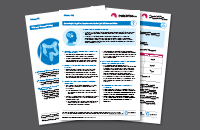 Full Guidelines
Full Guidelines
Click here to view article

 Tools
Tools


 Additional Documents
Additional Documents
Click here to see additional documents

Screening for Developmental Delay in Children Aged 1 to 4 Years (2016)
The recommendation applies only to children aged 1 to 4 years who are not at high risk for developmental delay, have no signs suggestive of a developmental delay and whose parents or clinicians have no concerns about development. Thus, this recommendation applies to children for whom there is no concern about failure to sequentially acquire age-appropriate developmental milestones for gross and fine motor, social/emotional, language, and cognitive domains. Milestone ages should be based on the oldest age by which the skill should have been achieved.
The recommendation does not apply to children who present with signs, symptoms, or parental concern that could indicate delayed development; or whose development is being closely monitored because of risk factors, such as premature birth or low birth weight.
Recommendations
- We recommend against screening1 for developmental delay using standardized tools in children aged 1 to 4 years with no apparent signs of developmental delay and whose parents and clinicians have no concerns about development.
(Strong recommendation; low quality evidence)
Considerations for Implementation
While we recommend against screening for developmental delay using a standardized tool, clinicians should continue with standard clinical practice for children including monitoring of development, identification of risk factors, elicitation of parental concerns and discussing development with parents. If a child has a significant risk factors associated with developmental delay, parents or clinician have any concerns about development, or there are abnormalities the developmental trajectory of a child, clinicians should consider the possibility of developmental delay and conduct further assessment (or specialist evaluation) as clinically indicated. Clinicians should be aware of factors that may increase the risk for developmental delay, such as low birth weight, premature birth or family history; and are encouraged to remain vigilant for social, economic or environmental factors (such as lower maternal education level, mental illness, neglect or maltreatment, poverty, English as a second language) that might reduce the likelihood for parents to raise concerns about development.
1Screening refers to population-based screening. That is, the use of a standardized tools to search for developmental delay among children that do not show any apparent signs of developmental delay, are not considered to be at high risk for having developmental delay, and whose parents or clinicians have no concerns about development.
Screening differs from developmental surveillance, which is the ongoing monitoring of development, identification of risk factors and elicitation of parental concerns. Developmental surveillance, though a common term in developmental paediatrics, is what the CTFPHC would normally consider to be part of standard clinical practice for children.
Screening differs from case finding, which is the identification of DD in populations that are at increased risk of developmental delays and often does not involve the use of a specific tool. There is often a misperception that screening refers to testing children that are suspected of having DD or at high risk for developmental delay.
Both screening and case finding are intended to detect signs or symptoms suggestive of DD, which (if detected) will require diagnosis to establish the presence or absence of a specific condition.



